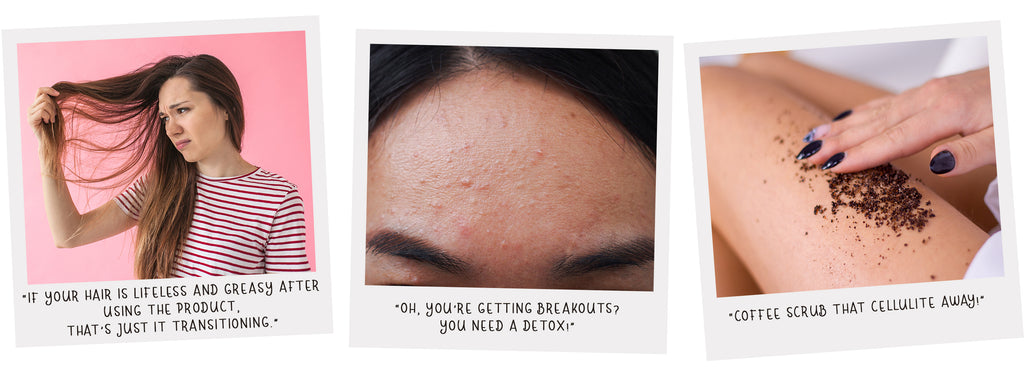The cosmetics industry has one goal: to sell you more products.
That’s sort of our goal too - only we’re not just doing it to make money, but to make positive change too. It means that we’ll do major swerves around perpetuating common (and totally rubbish) skincare myths. At the end of the day, we want you to keep using low-impact, high-quality skin and hair care, and that long-term gain is about honesty in the short term. So, here are those common skincare fibs, and why they simply aren’t true.

“If your hair is lifeless and greasy after using the product, that’s just it transitioning.”
Uh, no. The transition period isn’t a thing. It’s just marketing speak for ‘this product doesn’t suit you, but keep using it, I need to sell more”. You’ll most often see this bogus advice when switching from a traditional shampoo or face wash to a bar or natural product. The reality? If the pH is right, and it suits your hair or skin type, you’ll be happy from that first wash. If you’re not, it’s almost certainly because you need to try a different product. This is the main reason we offer mini versions of our products - sometimes it takes a bit of testing to find the perfect combination. There is something called purging, when you use a product that promotes cell turnover (like an AHA), bringing whiteheads to the surface, but that’s completely different to the mythical ‘transition period’.
“Oh, you’re getting breakouts? You need a detox!”
Let’s be clear. Your liver? Yep! Your kidneys? Excellent remover of ‘toxins’. Your skin - not so much. That means that if a product claims to detoxify your skin, your response should be a very large eyebrow-raise. Products or recipes that claim to detox are not effective, and they can also be damaging - they often contain drying and irritating ingredients like witch hazel, menthol, alcohol, or abrasive scrub agents, which strip your natural barrier, irritate your skin, send your oil production into overdrive and probably make your pimples worse. We’ve seen recipes for detoxing your armpit skin to make natural deodorants more effective. This is not a thing so your best bet is to find an aluminium-free deodorant that does actually work.
“Big pores? Oh, yes, try this pore-refining serum.”
Please do not. Your pores are just the size they are, and nothing you can put on them will open and close them. Your pores can look bigger though - and that’s nearly always because they have dirt in them. Easy fix: wash your face, gently. Astringents and toners do a good job of making pores look smaller too - they shrink the appearance of pores because they work on the keratin in your skin. Changing the pH or temperature of the skin affects the keratin’s salt bonds, making the tissue draw together. But the downside is that these products almost always dry out your skin.
“Oily skin doesn’t need moisturising.”
But actually, it does. There are two ways your skin can be ‘dry’. One is from a lack of oil - that’s a skin type eg. ‘dry skin’. The other is dehydrated skin - your skin can be oily and dehydrated (gah!). So that’s what moisturisers do - they put water back into your skin. Without it, you could start to see inflammation, which can cause premature aging and breakouts. Our face products for oily skin don’t have a lot of those nourishing oils that dry-skinned people need. They do have humectants like glycerin to draw in moisture and lock it into the skin, leaving it all plump and healthy.
“Your skin needs collagen!”
I mean, your skin makes collagen - it’s a critical building block for our bodies, and it’s true that we make less and less of it as we age (hello creaky knees). It may seem like putting collagen on your face will get rid of wrinkles, but if any actually gets into your body, it just gets broken down into amino acids and used elsewhere in your body. Taking collagen is a bit iffy too - The jury is still out on whether these supplements do anything at all for skin in people who are already eating well.
“Coffee scrub that cellulite away!”
It can be fun to get some pals over, watch Love Actually and play with homemade scrubs. But, yeah. It’s not going to do anything about your cellulite. Cellulite - the dimples in your skin - is totally normal and because the fat cells and connective tissue structure that cause cellulite is under your skin, the only things that really do affect it are your hydration levels, fat loss and cosmetic surgery.
The caffeine in coffee grounds will stimulate the skin, and scrubbing it in will plump everything up, making cellulite look less obvious. It’s still there though, sorry.

 Impact
Impact Blog
Blog Store Locator
Store Locator


